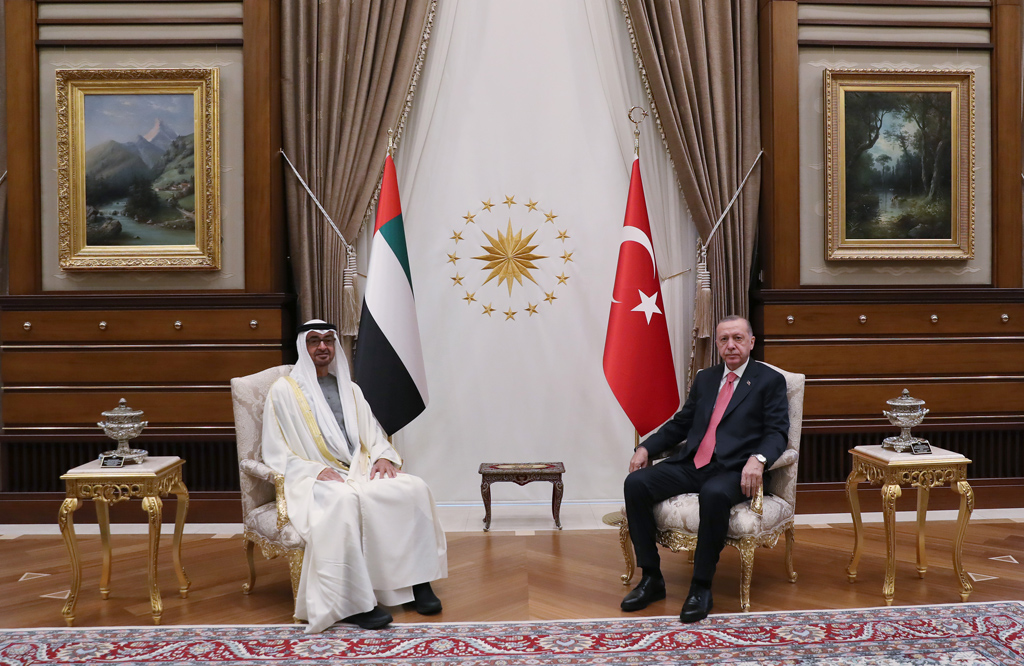United Arab Emirates Crown Prince Mohammed bin Zayed is expected to visit Turkey on November 24, 2021, for the first time in 10 years. The visit comes at a time when a wave of normalization has been shaping in the Middle East. Turkey and the UAE for many years have been backing opposing sides in several regional affairs, thereon the meeting between the two leaders is expected to be the “beginning of a new era.”
 On the eve of the meeting between Erdoğan and MBZ, questions about possible issues that may be discussed and the meeting’s impact on bilateral and regional affairs have been discussed in media debates. Given that, experts in the field have contemplated these questions and have provided their opinions regarding the meeting.
Prepared by
Gloria Shkurti Özdemir
Experts
Muhittin Ataman
İsmail Numan Telci
Ali Bakir
Yusuf Erim
Cinzia Bianco
Mahmut Alrantisi
On the eve of the meeting between Erdoğan and MBZ, questions about possible issues that may be discussed and the meeting’s impact on bilateral and regional affairs have been discussed in media debates. Given that, experts in the field have contemplated these questions and have provided their opinions regarding the meeting.
Prepared by
Gloria Shkurti Özdemir
Experts
Muhittin Ataman
İsmail Numan Telci
Ali Bakir
Yusuf Erim
Cinzia Bianco
Mahmut Alrantisi
 Muhittin Ataman
Editor-in-Chief of Insight Turkey
Turkey and the United Arab Emirates (UAE) have been experiencing a tense relationship since the eruption of the Arab insurgencies and revolutions. Turkey and the UAE have supported opposing sides in many regional conflicts such as the Libyan crisis and the blockade of Qatar. While Turkey has been supporting the powers of change, the UAE has been supporting the powers of the status quo. Since then, there has been a zero-sum relationship between the two countries. The UAE has mobilized a huge amount of resources in its anti-Turkish policies in Syria, Libya, Yemen, Egypt, Sudan and Somalia. The UAE has even been supporting the Greek claims in the Eastern Mediterranean.
However, the two countries have been in contact in recent months and have made some progress. One of the most significant steps was the visit of UAE National Security Advisor Tahnoun bin Zayed Al Nahyan last August. Authorities from the two countries have discussed investment possibilities. Turkish President Recep Tayyip Erdoğan stated that he is ready to meet with the de facto leader of the UAE, Crown Prince Mohammed bin Zayed.
Turkey and the UAE have realized that it is not sustainable for two effective actors in the Middle East not to have a direct dialogue. For Turkey, the visit is part of the normalization efforts with regional rival countries such as Egypt and Saudi Arabia. Turkey’s priority is ending diplomatic isolation and attracting foreign investors to the Turkish economy. On the other hand, the UAE has decided to recalibrate its foreign relations. The UAE rulers have understood that it is impossible to ignore Turkey’s role in the regional issues, and alienating Turkey is only damaging Emirati interests.
It is expected that the UAE and Turkey will discuss many issues during the crown prince’s visit, from economic issues to regional crises. The visit will contribute to and accelerate the positive process initiated at the beginning of 2021. However, it is too early to talk about solving all of the problems between the two countries. It seems that regional perspectives of the two countries will remain conflictual.
Back to top
Muhittin Ataman
Editor-in-Chief of Insight Turkey
Turkey and the United Arab Emirates (UAE) have been experiencing a tense relationship since the eruption of the Arab insurgencies and revolutions. Turkey and the UAE have supported opposing sides in many regional conflicts such as the Libyan crisis and the blockade of Qatar. While Turkey has been supporting the powers of change, the UAE has been supporting the powers of the status quo. Since then, there has been a zero-sum relationship between the two countries. The UAE has mobilized a huge amount of resources in its anti-Turkish policies in Syria, Libya, Yemen, Egypt, Sudan and Somalia. The UAE has even been supporting the Greek claims in the Eastern Mediterranean.
However, the two countries have been in contact in recent months and have made some progress. One of the most significant steps was the visit of UAE National Security Advisor Tahnoun bin Zayed Al Nahyan last August. Authorities from the two countries have discussed investment possibilities. Turkish President Recep Tayyip Erdoğan stated that he is ready to meet with the de facto leader of the UAE, Crown Prince Mohammed bin Zayed.
Turkey and the UAE have realized that it is not sustainable for two effective actors in the Middle East not to have a direct dialogue. For Turkey, the visit is part of the normalization efforts with regional rival countries such as Egypt and Saudi Arabia. Turkey’s priority is ending diplomatic isolation and attracting foreign investors to the Turkish economy. On the other hand, the UAE has decided to recalibrate its foreign relations. The UAE rulers have understood that it is impossible to ignore Turkey’s role in the regional issues, and alienating Turkey is only damaging Emirati interests.
It is expected that the UAE and Turkey will discuss many issues during the crown prince’s visit, from economic issues to regional crises. The visit will contribute to and accelerate the positive process initiated at the beginning of 2021. However, it is too early to talk about solving all of the problems between the two countries. It seems that regional perspectives of the two countries will remain conflictual.
Back to top
 İsmail Numan Telci
ORSAM Vice President
First of all, the meeting will represent the beginning of a new era between Turkey and the United Arab Emirates (UAE). Gulf countries, whose room for maneuvers expanded during the Trump era, have implemented their interventionist foreign policies throughout the Middle East. However, due to the influence of the Biden era, the negative effects of COVID-19 and costly foreign policies, their interventionist foreign policies have become unsustainable. At the same time, the realization of political normalization moves among different countries in the Middle East and the settling of the Gulf crisis in January 2021 caused the Gulf's foreign relations to be redefined. As a matter of fact, it is seen that there are periods of political détente between the UAE and Turkey, as it was seen between Saudi Arabia and Turkey. It is necessary to take this political climate into account when evaluating the visit of Crown Prince Mohammed bin Zayed.
High-level political contacts between the two countries have increased recently. Following the phone calls at the foreign ministerial levels, President Erdoğan and the Crown Prince are also expected to hold face-to-face meetings. At the same time, there have been eventful days in Turkey's diplomatic missions in the UAE. Recently, Mohammed bin Zayed met with Turkey's Ambassador to Abu Dhabi, while Dubai’s emir, Sheikh Mohammed bin Rashid Al Maktoum, also visited Turkey's Expo 2020 pavilion. In the context of increasing commercial and economic relations, the UAE has emerged as Turkey's largest trading partner within the GCC in recent years.
Although the meeting between the two leaders means a rapprochement between the two countries, it is evident that there are still some differences when it comes to foreign policy issues. While the UAE has attempted to readmit the Syrian regime into the Arab League, Turkey's policies for the fight against terrorism and the prevention of loss of life in Syria continue. In Lebanon, both countries have various engagements. It is seen that the UAE is involved in the crisis in Lebanon and a political crisis continues between the two countries. On the other hand, Turkey supports the government in Lebanon and offers its support for the country's recovery from the economic and political crisis. In Libya, the UAE had to reduce its engagement as Turkey and Qatar increased their influence in the region. In Yemen, where Turkey supports an U.N.-focused political solution, the UAE also slowed down. In this context, various conflict zones may also be discussed in the meeting between the two leaders.
It is clear that special attention will be given to the investment issue at the meeting. Recently, Abu Dhabi's Exchange Investment Fund invested $555 million, Abu Dhabi's Fenix company invested $5 million, and Kitopi invested $415 million in Turkey. Again, ADQ, headed by Tahnoun bin Zayed, First Abu Dhabi Bank, G42, Royal Group and International Holding Company are expected to make investments of around $10 billion in Turkey. Therefore, within the scope of Crown Prince Mohammed bin Zayed's possible visit, it is expected that regional developments such as Syria, Libya, Lebanon and Yemen, as well as investments opportunities in Turkey will be discussed.
Back to top
İsmail Numan Telci
ORSAM Vice President
First of all, the meeting will represent the beginning of a new era between Turkey and the United Arab Emirates (UAE). Gulf countries, whose room for maneuvers expanded during the Trump era, have implemented their interventionist foreign policies throughout the Middle East. However, due to the influence of the Biden era, the negative effects of COVID-19 and costly foreign policies, their interventionist foreign policies have become unsustainable. At the same time, the realization of political normalization moves among different countries in the Middle East and the settling of the Gulf crisis in January 2021 caused the Gulf's foreign relations to be redefined. As a matter of fact, it is seen that there are periods of political détente between the UAE and Turkey, as it was seen between Saudi Arabia and Turkey. It is necessary to take this political climate into account when evaluating the visit of Crown Prince Mohammed bin Zayed.
High-level political contacts between the two countries have increased recently. Following the phone calls at the foreign ministerial levels, President Erdoğan and the Crown Prince are also expected to hold face-to-face meetings. At the same time, there have been eventful days in Turkey's diplomatic missions in the UAE. Recently, Mohammed bin Zayed met with Turkey's Ambassador to Abu Dhabi, while Dubai’s emir, Sheikh Mohammed bin Rashid Al Maktoum, also visited Turkey's Expo 2020 pavilion. In the context of increasing commercial and economic relations, the UAE has emerged as Turkey's largest trading partner within the GCC in recent years.
Although the meeting between the two leaders means a rapprochement between the two countries, it is evident that there are still some differences when it comes to foreign policy issues. While the UAE has attempted to readmit the Syrian regime into the Arab League, Turkey's policies for the fight against terrorism and the prevention of loss of life in Syria continue. In Lebanon, both countries have various engagements. It is seen that the UAE is involved in the crisis in Lebanon and a political crisis continues between the two countries. On the other hand, Turkey supports the government in Lebanon and offers its support for the country's recovery from the economic and political crisis. In Libya, the UAE had to reduce its engagement as Turkey and Qatar increased their influence in the region. In Yemen, where Turkey supports an U.N.-focused political solution, the UAE also slowed down. In this context, various conflict zones may also be discussed in the meeting between the two leaders.
It is clear that special attention will be given to the investment issue at the meeting. Recently, Abu Dhabi's Exchange Investment Fund invested $555 million, Abu Dhabi's Fenix company invested $5 million, and Kitopi invested $415 million in Turkey. Again, ADQ, headed by Tahnoun bin Zayed, First Abu Dhabi Bank, G42, Royal Group and International Holding Company are expected to make investments of around $10 billion in Turkey. Therefore, within the scope of Crown Prince Mohammed bin Zayed's possible visit, it is expected that regional developments such as Syria, Libya, Lebanon and Yemen, as well as investments opportunities in Turkey will be discussed.
Back to top
 Ali Bakir
Ibn Khaldon Center, Qatar University
I believe that the visit of Abu Dhabi’s Crown Prince and de facto ruler of the UAE, Mohammed bin Zayed, to Ankara is a unique opportunity to reset the relations between the UAE and Turkey. In the last eight years or so, the relations between the two countries deteriorated significantly over regional matters related primarily to the Arab uprisings and the 2017 Gulf crisis. While Turkey did not pay much attention to the UAE’s disruptive policies, Abu Dhabi made targeting Turkey and undermining Turkey’s regional interests a top priority. Currently, the regional "de-escalation moment" in the Middle East offers a chance to turn a new page between the two capitals. Focusing on economic relations, investments and mutual interests right now is a good way to test the waters and whether they can build trust and develop a healthy relationship.
Having said this, I think we should always keep our expectations moderate when it comes to the prospects of the relations between the two countries in the current situation. I don’t think the political disagreements between Ankara and Abu Dhabi will simply disappear. The challenge is to develop a mechanism to address these challenges in a way that helps contain rather than exacerbate them. This will largely depend on whether the new Emirati approach is genuine and sustainable or not.
Back to top
Ali Bakir
Ibn Khaldon Center, Qatar University
I believe that the visit of Abu Dhabi’s Crown Prince and de facto ruler of the UAE, Mohammed bin Zayed, to Ankara is a unique opportunity to reset the relations between the UAE and Turkey. In the last eight years or so, the relations between the two countries deteriorated significantly over regional matters related primarily to the Arab uprisings and the 2017 Gulf crisis. While Turkey did not pay much attention to the UAE’s disruptive policies, Abu Dhabi made targeting Turkey and undermining Turkey’s regional interests a top priority. Currently, the regional "de-escalation moment" in the Middle East offers a chance to turn a new page between the two capitals. Focusing on economic relations, investments and mutual interests right now is a good way to test the waters and whether they can build trust and develop a healthy relationship.
Having said this, I think we should always keep our expectations moderate when it comes to the prospects of the relations between the two countries in the current situation. I don’t think the political disagreements between Ankara and Abu Dhabi will simply disappear. The challenge is to develop a mechanism to address these challenges in a way that helps contain rather than exacerbate them. This will largely depend on whether the new Emirati approach is genuine and sustainable or not.
Back to top
 Yusuf Erim
TRT World, Editor at large
The meeting between Turkish President Recep Tayyip Erdoğan and Abu Dhabi's Crown Prince Mohammed bin Zayed Al Nahyan should not be viewed in isolation but as part of a bigger picture that displays a thawing among rivalries in the Middle East as the region adjusts to new dynamics. Recent events such as the Aramco attack, the end of the GCC blockade of Qatar, the Abraham Accords, the election of U.S. President Joe Biden, the U.S.’ withdrawal from Afghanistan and the general perception that there will be less U.S. engagement in the Middle East going forward have led regional actors to adjust their foreign policies according to the changing landscape. Many of the issues that created the Turkey-UAE rivalry over the past decade have become less of a priority. The cost of competition has created fatigue and diminishing geopolitical returns now make rapprochement a better investment for the future. This meeting gives the UAE a chance to heal its relationship with Turkey, home to NATO's second-largest army, which could prove to be an important security safeguard for Abu Dhabi in the face of future Iranian aggression and the absence of U.S. protection. With Turkey prioritizing an export-driven and low-cost credit-based growth model for its economy, Ankara will look to secure strong foreign direct investment to bolster a softening Turkish lira. Both sides will also most likely review their policies in Syria, Libya and Yemen, identifying areas where cooperation can be mutually beneficial, support security and stability, and advance the political solution process in each conflict.
Yusuf Erim
TRT World, Editor at large
The meeting between Turkish President Recep Tayyip Erdoğan and Abu Dhabi's Crown Prince Mohammed bin Zayed Al Nahyan should not be viewed in isolation but as part of a bigger picture that displays a thawing among rivalries in the Middle East as the region adjusts to new dynamics. Recent events such as the Aramco attack, the end of the GCC blockade of Qatar, the Abraham Accords, the election of U.S. President Joe Biden, the U.S.’ withdrawal from Afghanistan and the general perception that there will be less U.S. engagement in the Middle East going forward have led regional actors to adjust their foreign policies according to the changing landscape. Many of the issues that created the Turkey-UAE rivalry over the past decade have become less of a priority. The cost of competition has created fatigue and diminishing geopolitical returns now make rapprochement a better investment for the future. This meeting gives the UAE a chance to heal its relationship with Turkey, home to NATO's second-largest army, which could prove to be an important security safeguard for Abu Dhabi in the face of future Iranian aggression and the absence of U.S. protection. With Turkey prioritizing an export-driven and low-cost credit-based growth model for its economy, Ankara will look to secure strong foreign direct investment to bolster a softening Turkish lira. Both sides will also most likely review their policies in Syria, Libya and Yemen, identifying areas where cooperation can be mutually beneficial, support security and stability, and advance the political solution process in each conflict.
 Cinzia Bianco
Gulf Research Fellow, European Council on Foreign Relations
The UAE has had to take stock of a new de-escalatory trend in the region, strongly pushed by external factors – such as clear input from the Biden administration – and internal factors, such as the UAE’s need to cut back on costly and ineffective aggressive foreign policy to re-focus internally on the post-COVID recovery. All regional capitals, including Abu Dhabi and Ankara, want to discuss how the wider region could cooperate amid the ongoing retrenchment of the United States, and how regional players could fill the vacuums left by this. Given the general trend toward de-escalation, the UAE did not want to be left out from the new regional dynamics, where influence is once again projected by soft rather than hard power. There is now a clear sense of opportunity in riding the momentum for compromises across the region. The Emiratis are thinking of a reciprocal toning down on maximalist goals, especially in scenarios where international pressure also pushes toward conciliation, such as in Libya. They are also looking for possible alignments with Turkey in very conflictual theaters, such as Ethiopia and the wider Horn of Africa. Finally, Abu Dhabi is interested in exploring the chances of working around Turkey's red lines vis-à-vis Syria and the relations with Israel and understanding the potential evolution of de-escalatory processes between Turkey, Egypt and Saudi Arabia.
Back to top
Cinzia Bianco
Gulf Research Fellow, European Council on Foreign Relations
The UAE has had to take stock of a new de-escalatory trend in the region, strongly pushed by external factors – such as clear input from the Biden administration – and internal factors, such as the UAE’s need to cut back on costly and ineffective aggressive foreign policy to re-focus internally on the post-COVID recovery. All regional capitals, including Abu Dhabi and Ankara, want to discuss how the wider region could cooperate amid the ongoing retrenchment of the United States, and how regional players could fill the vacuums left by this. Given the general trend toward de-escalation, the UAE did not want to be left out from the new regional dynamics, where influence is once again projected by soft rather than hard power. There is now a clear sense of opportunity in riding the momentum for compromises across the region. The Emiratis are thinking of a reciprocal toning down on maximalist goals, especially in scenarios where international pressure also pushes toward conciliation, such as in Libya. They are also looking for possible alignments with Turkey in very conflictual theaters, such as Ethiopia and the wider Horn of Africa. Finally, Abu Dhabi is interested in exploring the chances of working around Turkey's red lines vis-à-vis Syria and the relations with Israel and understanding the potential evolution of de-escalatory processes between Turkey, Egypt and Saudi Arabia.
Back to top
 Mahmut Alrantisi
Researcher
The visit of UAE Crown Prince Mohammed bin Zayed to Turkey is not a surprise for observers, as it was preceded by several indicators that pointed to the possibility of this meeting. Among these indicators, at the bilateral level, were the meeting of UAE national security adviser Tahnoun bin Zayed Al Nahyan with the Turkish President and the meeting of the Crown Prince of Abu Dhabi with the Turkish Ambassador to the UAE. On the other hand, there is a campaign of regional developments that paved the way for this meeting between Erdoğan and the Crown Prince, including the end of the Gulf crisis at the beginning of the year through the Al-Ula agreement and the start of the Egyptian-Turkish dialogue rounds and other files.
If we were to explain the visit of the Crown Prince to Turkey, there are two important points that we need to focus. The first point that explains the visit is that regional actors are in line with the Biden Administration’s desire to calm differences and tensions in the region. We watched this in UAE policies in Yemen and related to this context is the lackluster performance of the Biden administration, which does not care about allies. In this context, Abu Dhabi reviewed its regional calculations and may seek to improve its relations with Iran and Turkey.
As for the second matter, it seems that there are conclusions, even if temporary, that states have come to that there is no longer a possibility to continue achieving results through a policy of rivalries and conflict in some issues. Perhaps the Libyan experience is an example of reaching the conflict in a dead end and that some results can be reached through dialogue and understanding rather than conflict. At the top of the issues that can be agreed upon without many obstacles is the economic file, trade cooperation and even simple defense deals in addition to some political issues. Furthermore, Turkey can benefit from Emirati investments well, especially at this time when the Turkish government is seeking to attract foreign investments.
But the visit does not mean the end of the disputes between the two countries, as several issues have accumulated in the direction of reshaping balances in the region.
In addition to the above, the UAE attaches importance to an understanding with Turkey in several regional issues, such as North Africa, the Palestinian issue, the Cyprus issue, etc. However, at the same time, UAE pays great attention to the Syrian issue and the restoration of the Assad regime’s legitimacy in the Arab world and international system. At this point UAE realizes that it needs to reach an understanding with Turkey.
There is an important point that we cannot ignore: The meeting between Erdoğan and MBZ is at the same time the meeting between the largest regional supporter and the most active regional opponent of the Arab Spring. As a result, this visit will be an important point in the course of this process.
Back to top
Mahmut Alrantisi
Researcher
The visit of UAE Crown Prince Mohammed bin Zayed to Turkey is not a surprise for observers, as it was preceded by several indicators that pointed to the possibility of this meeting. Among these indicators, at the bilateral level, were the meeting of UAE national security adviser Tahnoun bin Zayed Al Nahyan with the Turkish President and the meeting of the Crown Prince of Abu Dhabi with the Turkish Ambassador to the UAE. On the other hand, there is a campaign of regional developments that paved the way for this meeting between Erdoğan and the Crown Prince, including the end of the Gulf crisis at the beginning of the year through the Al-Ula agreement and the start of the Egyptian-Turkish dialogue rounds and other files.
If we were to explain the visit of the Crown Prince to Turkey, there are two important points that we need to focus. The first point that explains the visit is that regional actors are in line with the Biden Administration’s desire to calm differences and tensions in the region. We watched this in UAE policies in Yemen and related to this context is the lackluster performance of the Biden administration, which does not care about allies. In this context, Abu Dhabi reviewed its regional calculations and may seek to improve its relations with Iran and Turkey.
As for the second matter, it seems that there are conclusions, even if temporary, that states have come to that there is no longer a possibility to continue achieving results through a policy of rivalries and conflict in some issues. Perhaps the Libyan experience is an example of reaching the conflict in a dead end and that some results can be reached through dialogue and understanding rather than conflict. At the top of the issues that can be agreed upon without many obstacles is the economic file, trade cooperation and even simple defense deals in addition to some political issues. Furthermore, Turkey can benefit from Emirati investments well, especially at this time when the Turkish government is seeking to attract foreign investments.
But the visit does not mean the end of the disputes between the two countries, as several issues have accumulated in the direction of reshaping balances in the region.
In addition to the above, the UAE attaches importance to an understanding with Turkey in several regional issues, such as North Africa, the Palestinian issue, the Cyprus issue, etc. However, at the same time, UAE pays great attention to the Syrian issue and the restoration of the Assad regime’s legitimacy in the Arab world and international system. At this point UAE realizes that it needs to reach an understanding with Turkey.
There is an important point that we cannot ignore: The meeting between Erdoğan and MBZ is at the same time the meeting between the largest regional supporter and the most active regional opponent of the Arab Spring. As a result, this visit will be an important point in the course of this process.
Back to top















